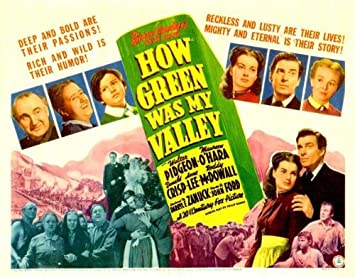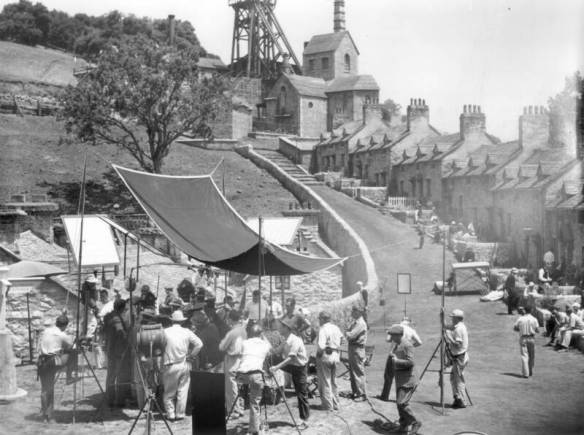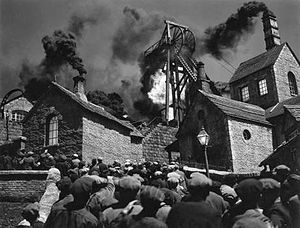
⭐️ ⭐️ ⭐️⭐️
Sir Anthony Hopkins was the latest of many Oscar winners with a Welsh connection, one in particular is often overlooked. The greatest film ever made is considered to be Citizen Kane, but it lost out on Best Picture in 1941 to a story about a family of Welsh coal miners.
How Green Was My Valley is about the Morgan family, and set between 1890-1914. It tells of the lives of Gwilym, his wife Beth, and their seven children living in a coal mining village in the Rhondda. Derided for its inaccuracies, mining families of the time could barely recognise their own lives. The novel was also far from authentic as the writer, Richard Llewellyn, was the son of Welsh parents who ran a pub in London. Born and raised there, he had an English accent, and never set foot in Wales until he was an adult. Most of the background came from listening to stories told by others, and written while on army service in India. The rights were bought by Fox for $300,000 and adapted by American screenwriter Philip Dunne, who had no idea about Wales. It wasn’t even filmed there: The original intent was to make it on location, in colour, and as a four hour epic like Gone With The Wind, but the outbreak of World War Two ended that. Instead an entire village was built in Malibu Creek State Park, taking 150 builders six months and costing $110,000, with the hill painted black to look like coal slag.

Studio executives also watered down the politics of the story, uneasy with its pro-union and socialist message. Gwilym Morgan is seen as being an independent leader, opposed to unions. Most of his sons disagree, and it is this issue that eventually leads to the decline of both the Morgan family and the valley itself.
The biggest criticism of the film is the poor Welsh accents by the actors, as there was only one Welsh person in the entire cast. Rhys Williams from Clydach plays Dai Bando, the miner who teaches Huw how to box. The rest are Irish, Scottish, English and even Canadian. One of the better accents comes from Mr Parry the chapel deacon, played by Arthur Shields. The brother of Barry Fitzgerald who plays Cyfartha, he fought in the Easter Rebellion in 1916 and was imprisoned afterwards in a camp in Frongoch, Wales. Oddly enough John Loder (Ianto Morgan) was a British officer and fought on the other side.
Despite the criticism it should be remembered that the film won 5 Oscars, and brought Wales to the attention of the world. It also managed to create a genuine feeling of Welshness by using traditional songs & hymns, such as Men of Harlech, Cwm Rhondda and Calon Lan, employing most of the Welsh singers in California. For me it has the one thing that Citizen Kane lacked, heart.

There is one scene in particular that captures the poetry, sadness and humour that are endemic to Wales: a disaster brings everyone to the mine, including Dai Bando, his constant companion Cyfartha, and Mr Gruffydd, the preacher who was about to leave the valley. With men still trapped, he appeals for volunteers to rescue them:
Mr. Gruffydd: “Who is for Gwilym Morgan and the others?”
Dai Bando: “I, for one. He is the blood of my heart. Come Cyfartha.”
Cyfartha: “Tis a coward I am. But I will hold your coat.”
The film left its mark on several of the cast and crew: Anna Lee (Bronwyn) became pregnant halfway through filming, Maureen O’Hara later named her daughter Bronwyn, Donald Crisp & Beth Allgood (Mr & Mrs Morgan) were nominated for Best Supporting Oscars, with Crisp winning, and John Ford won his third Best Director Oscar. The film also won cinematography and for Art Direction, due mainly to the village set. Although many believe Citizen Kane to have been robbed, I think that at a time when the world was going to war, a film about a family struggling to stay together through tragedy was the right choice.
“Men like my father cannot die. They are with me still – real in memory as they were in flesh, loving and beloved forever. How green was my Valley then.”
